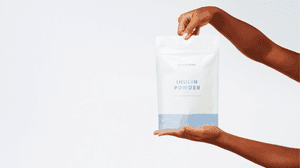
A healthy gut is important for a variety of processes in the body. It contributes towards immunity, weight, mood, and much more. To help you get to know your gut, we've asked nutritionist Rachel Greene to answer your digestion questions...

How do I know if I have an unhealthy gut?
It’s completely normal to have some bloating, especially after a large meal or at the end of the day. However, bloating that’s particularly painful or persistent may be signs of an unhealthy gut. Similarly, a big change in bowel habit such as prolonged diarrhoea or constipation (or both) are signs that your body isn’t functioning quite as well as it should.
What are your top tips to prevent bloating?
Bloating is a completely natural part of digestion. If we fill our stomach with food, it has to be stored somewhere! For most people, bloating tends to occur in the evenings and is usually gone by the morning. However, if you have a particularly sluggish digestive system or a condition such as IBS, bloating can happen more regularly.
My top tips:
Make sure to drink plenty of water – the UK guidelines are around 1.2L, or 6-8 glasses of water. Water is essential for much of the digestive process and if you don’t like water, try adding squash or fresh fruit to add flavour.
Gentle movement can help to stimulate digestion. Light exercise like yoga or a short walk can help to increase blood flow and wake up the digestive system.
Practicing mindful eating can also help to prevent bloating. This involves chewing our food for longer which creates more enzymes to aid digestion. Try to eat at a table with no distractions like your phone or the TV.
"Water is essential for much of the digestive process."
Which vegetables cause gas and why?
The vegetables most well-known for creating gas are the cruciferous family. These include broccoli, cabbage, cauliflower, sprouts and kale. These vegetables contain a sugar that is difficult to digest which causes bloating and gas. However, these vegetables are great sources of various micronutrients - the darker the green, the higher the vitamin and mineral content. Try not to eliminate these completely and opt for a smaller portion instead.
Which vegetables have a lower glycaemic index? I have sensitivity to digesting healthy carbs.
The glycaemic index (GI) is a measure of how much a food raises blood sugar levels compared to white bread. Low GI vegetables include common salad ingredients such as peppers, lettuce, tomatoes, and cucumbers. Higher GI vegetables are usually ‘starchy’ e.g. parsnips, and potatoes. The addition of a healthy fat source can help to reduce the GI content of a meal. Alternatively, swapping to low fibre vegetables can help with digestion of carbohydrates, although this doesn’t necessarily correlate to GI content.
"The glycaemic index is a measure of how much a food raises blood sugar levels compared to white bread."
Which gut health supplements would you recommend?
If you are suffering from any kind of digestive issues or just want to boost your overall health, a digestive supplement is probably the place to start.
Myvitamins Bio Bite
s are a high fibre and low sugar snack in a delicious Chocolate Orange flavour. Fruit and nut based based snacks provide natural sweetness (avoiding refined sugars) and contain healthy fats to help you reach your daily goal. The addition of protein will also help you feel fuller for longer, making these a great addition to your daily routine.
- is a convenient source of a popular prebiotic that helps good gut bacteria to grow by feeding it.
Is gut health related to weight loss?
Absolutely! If your digestive system is running on the slow side, this can increase the likelihood of bloating and constipation. Your body is also more likely to hold onto water, leading to a higher number on the scales. Improving digestion can help to shed this water weight. Furthermore, a digestion system that is running at a healthy speed is more likely to absorb nutrients properly, keeping you healthy whilst on your weight loss journey.
How does digestion impact mental health?
Research has shown a significant relationship between poor gut health and common mental health conditions (depression and anxiety.) However, reducing refined sugar intake and the addition of probiotics had a positive impact in most of the people included in these studies. Whilst not a complete cure for mood disorders, eating a balanced diet low in processed products is an excellent way to boost both mental and physical health.
What's the difference between prebiotics, probiotics and live cultures?
Probiotics contain millions (or billions) of bacteria – the good kind – that support digestion by multiplying in the gut. Probiotics are usually found in a supplement and contain specific bacteria. Live cultures on the other hand, are typically found in yoghurts and fermented food. These are a live bacteria, that support gut health but are also important for food manufacturing i.e. live cultures added to milk is what turns it into yoghurt!
Prebiotics are the sugars that help to feed the healthy gut bacteria and play more of a role gut health maintenance.
"A diet high in refined sugar diet can lead to inflammation within the body."
Is sugar bad for your gut? Are there any foods I should be avoiding for good gut health?
A diet high in refined sugar diet can lead to inflammation within the body. This can result in erosion of the gut lining, leading to symptoms of poor gut health. An easy way to improve gut health is to reduce packaged and processed foods. Swapping to a home-made version means you can control the amount of sugar that goes into your food. That said, moderation is key for most people, so don’t feel you have to eliminate sugar completely.
Why is fibre important and how much should I be eating each day?
A low fibre diet is more likely to lead to slow digestion, bloating, and constipation. Dietary fibre is important not only for gut health, but also for the removal of toxins and waste products. An adequate amount of dietary fibre can help to improve energy levels, heart health, and can contribute towards clearer skin. The recommended daily intake of fibre is 30g p/day. To reach this, make sure to incorporate plenty of fruit, vegetable, seeds and wholegrains into your diet.
https://www.nhs.uk/conditions/bloating/
https://documents.hants.gov.uk/hms/HealthyEatingontheRun-LowGlycemicIndexFoodList.pdf
https://pubmed.ncbi.nlm.nih.gov/31952249/
https://www.ncbi.nlm.nih.gov/pmc/articles/PMC3539293/ · https://pubmed.ncbi.nlm.nih.gov/27509521/
https://www.bmj.com/content/369/bmj.m2382
https://www.nhs.uk/live-well/eat-well/digestive-health/how-to-get-more-fibre-into-your-diet/









